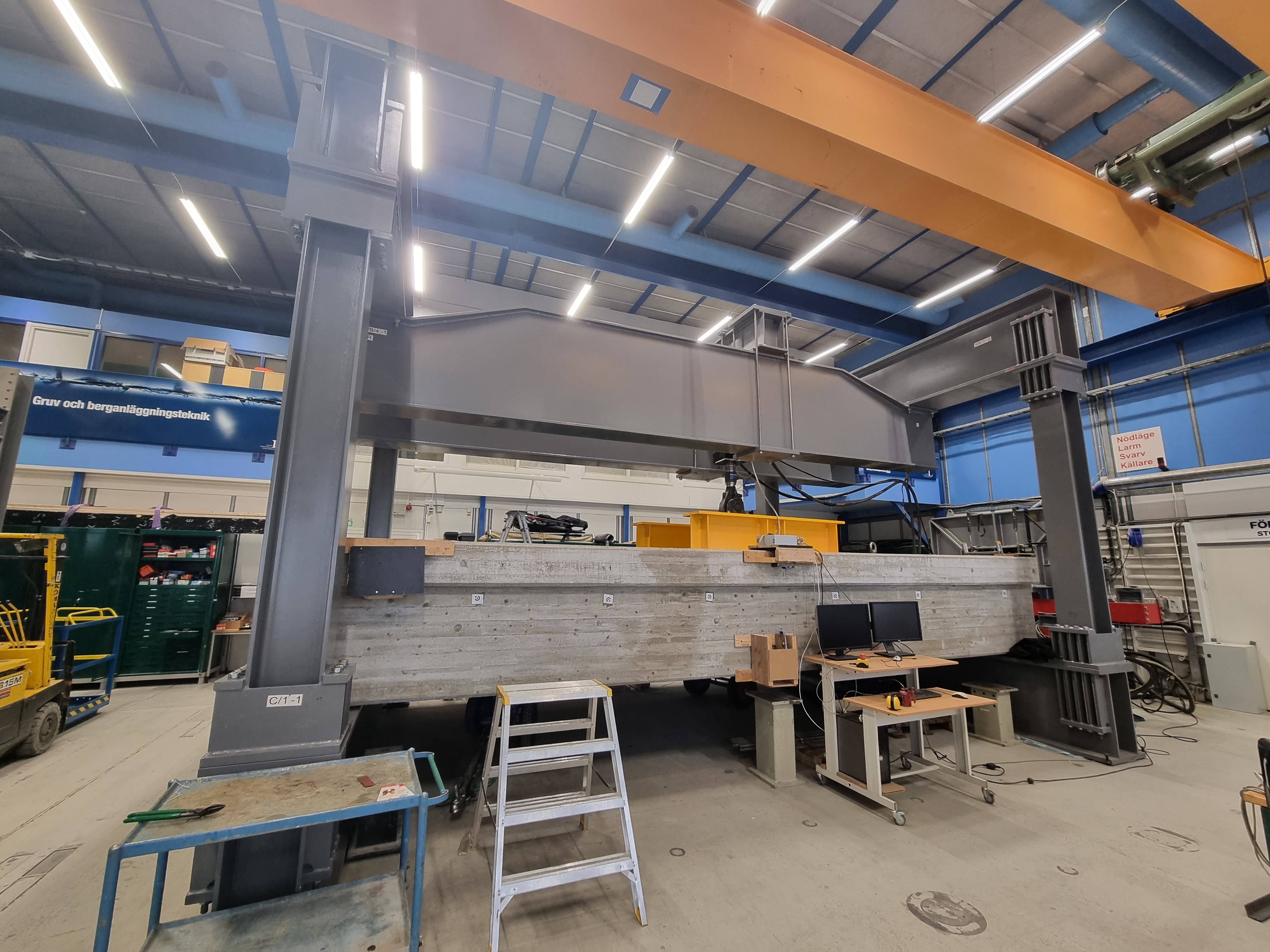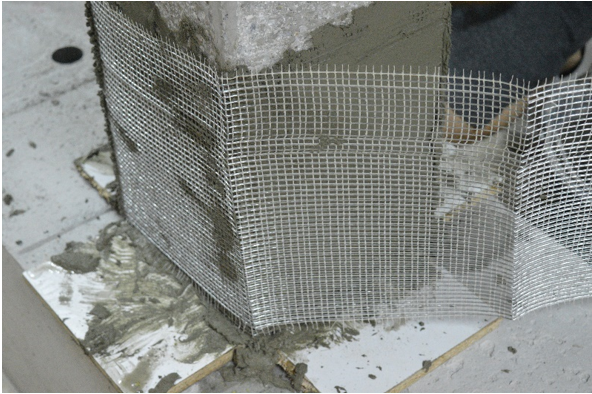Monday, 16 October 2023
Researchers from the University of Nottingham are collaborating with Luleå University of Technology in Sweden for the first time, on a project that aims to improve the resilience of the world’s bridges – making them safer and more sustainable as traffic levels rise.
 Luleå University of Technology's lab
Luleå University of Technology's lab
The recent 20-month closure of Nottingham’s Clifton Bridge due to corroded steel, which briefly made the city one of the most congested in the world, as well as the ongoing RAAC concrete crisis demonstrate that much of the UK’s current infrastructure is nearing, or has exceeded, its expected design life. With temperatures soaring due to climate change, and traffic levels gradually rising again post-pandemic, the speed of this deterioration is only increasing.
When it comes to bridges, it’s not economically or environmentally possible to simply replace them, meaning the only viable solution is to repair and strengthen them. In the UK alone, the cost of repairing bridges due to corrosion damage is estimated to cost millions of pounds.
Non-corrosive Fibre-Reinforced Polymer (FRP) composites are excellent strengthening systems for corrosion-damaged concrete structures, but they come with their own drawbacks, such as high price, high environmental impact due to resin use, and poor fire resistance. As a result, a new generation of composites has been developed – Fibre-Reinforced Cementitious Mortar (FRCM). FRCMs are compatible with concrete, breathable, resistant to fire, applicable on wet surfaces, sustainable, reversible, low carbon, and cost-effective – being at least 30% cheaper than FRPs.
 An example of FRCM application
An example of FRCM application
The main goal of the Climate Adaptation for REsilient Bridges (CARE) project is to find durable and sustainable solutions by investigating how different temperatures and accumulated damage caused by repeated load cycles affect the performance of FRCM composites when used in bridge strengthening.
Dr Georgia Thermou, Assistant Professor in Structural Engineering at the University of Nottingham, said: “Although experimental evidence has demonstrated the efficiency of FRCMs when it comes to improving undamaged structures, it has not been tested on more complex structural systems with accumulated damage or that have been subject to seasonal temperature changes.
“Our experiments and simulations will generate new knowledge, which will benefit the construction and composites industries by providing a sustainable solution for strengthening bridges and creating a new market for composites respectively."
This will greatly benefit society by providing safe and sustainable infrastructure that will contribute towards a greener economy and, crucially, minimise bridge closures or even failures.
The CARE project has been funded by the Royal Society as part of its International Exchanges scheme, which allows scientists across the UK to collaborate with leading institutions overseas.
Collaboration across borders is essential for tackling the global challenges we face in infrastructure and sustainability. This partnership with the University of Nottingham allows us to combine our expertise in structural engineering and material science to develop innovative solutions for bridge resilience.
Dr Jaime Gonzalez-Libreros, Associate Senior Lecturer at Luleå University of Technology, who will be collaborating closely with Prof. Sas and Dr. Thermou in the project, added: “Our aim is not just to extend the lifespan of existing structures but to do so in a way that is economically viable and environmentally responsible. This project is a step forward in creating a sustainable future for our communities.”
Dr Thermou added: “Being able to establish connections and collaborate with other leading universities across the world is crucial when it comes to sharing knowledge and finding solutions that multiple countries can benefit from, so I’m looking forward to working with Professor Sas and his research group to see what we can learn together over the next two years. I would also like to acknowledge Royal Society for supporting this effort and enabling the project to take place.”
Story credits
About the Faculty of Engineering
Made up of six departments – Architecture and Built Environment, Chemical and Environmental Engineering, Civil Engineering, Electrical and Electronic Engineering, Mechanical, Materials and Manufacturing Engineering and Foundation Engineering and Physical Sciences – the university’s Faculty of Engineering is home to more than 5,600 students and 800 staff.
The faculty, which has educated engineers and architects for more than 140 years, was the first in the country to be accredited with an Athena SWAN Gold Award for excellence in advancing gender equality across higher education and research and is home to multiple state-of-the-art facilities, including the recently opened £40m Power Electronics and Machines Centre (PEMC).
With research at its heart, 20 research groups are undertaking pioneering projects for a sustainable future across several themes – including net zero transport, sustainable energies and the built environment, advanced manufacturing, and healthcare technologies – and has delivered a positive impact in more than 20 countries. Within those countries, the faculty’s research has supported 500 companies and three governments – that have changed their strategies as a result of its research – and has also directly created jobs for around 3,000 people across the world.
About Luleå University of Technology:
Luleå University of Technology is in strong growth with world-leading competence in several research areas. We shape the future through innovative education and ground-breaking research results, and based on the Arctic region, we create global social benefit. Our scientific and artistic research and education are conducted in close collaboration with international, national and regional companies, public actors and leading universities. Luleå University of Technology has a total turnover of SEK 1.9 billion per year. We currently have 1,840 employees and 17,670 students.
In the coming years, multi-billion sums will be invested in Norrbotten and Västerbotten in large projects aimed at a more sustainable society nationally as well as globally. Luleå University of Technology is involved in several of these highly topical research projects and the societal transformation that follows. We have a wide range of training to match the skills that are in demand. We hope you will help us build the sustainable companies and communities of the future.
About the Royal Society:
The Royal Society is a self-governing Fellowship of many of the world’s most distinguished scientists drawn from all areas of science, engineering, and medicine. The Society’s fundamental purpose, as it has been since its foundation in 1660, is to recognise, promote, and support excellence in science and to encourage the development and use of science for the benefit of humanity. http://royalsociety.org/
Follow the Royal Society on Twitter (@royalsociety) or on Facebook (facebook.com/theroyalsociety).
Notes to editors:
About the University of Nottingham
Ranked 97 in the world and 17th in the UK by the QS World University Rankings, the University of Nottingham is a founding member of Russell Group of research-intensive universities. Studying at the University of Nottingham is a life-changing experience, and we pride ourselves on unlocking the potential of our students. We have a pioneering spirit, expressed in the vision of our founder Sir Jesse Boot, which has seen us lead the way in establishing campuses in China and Malaysia - part of a globally connected network of education, research and industrial engagement.
Nottingham was crowned Sports University of the Year by The Times and Sunday Times Good University Guide 2024 – the third time it has been given the honour since 2018 – and by the Daily Mail University Guide 2024.
The university is among the best universities in the UK for the strength of our research, positioned seventh for research power in the UK according to REF 2021. The birthplace of discoveries such as MRI and ibuprofen, our innovations transform lives and tackle global problems such as sustainable food supplies, ending modern slavery, developing greener transport, and reducing reliance on fossil fuels.
The university is a major employer and industry partner - locally and globally - and our graduates are the third most targeted by the UK's top employers, according to The Graduate Market in 2024 report by High Fliers Research.
We lead the Universities for Nottingham initiative, in partnership with Nottingham Trent University, a pioneering collaboration between the city’s two world-class institutions to improve levels of prosperity, opportunity, sustainability, health and wellbeing for residents in the city and region we are proud to call home.
More news…